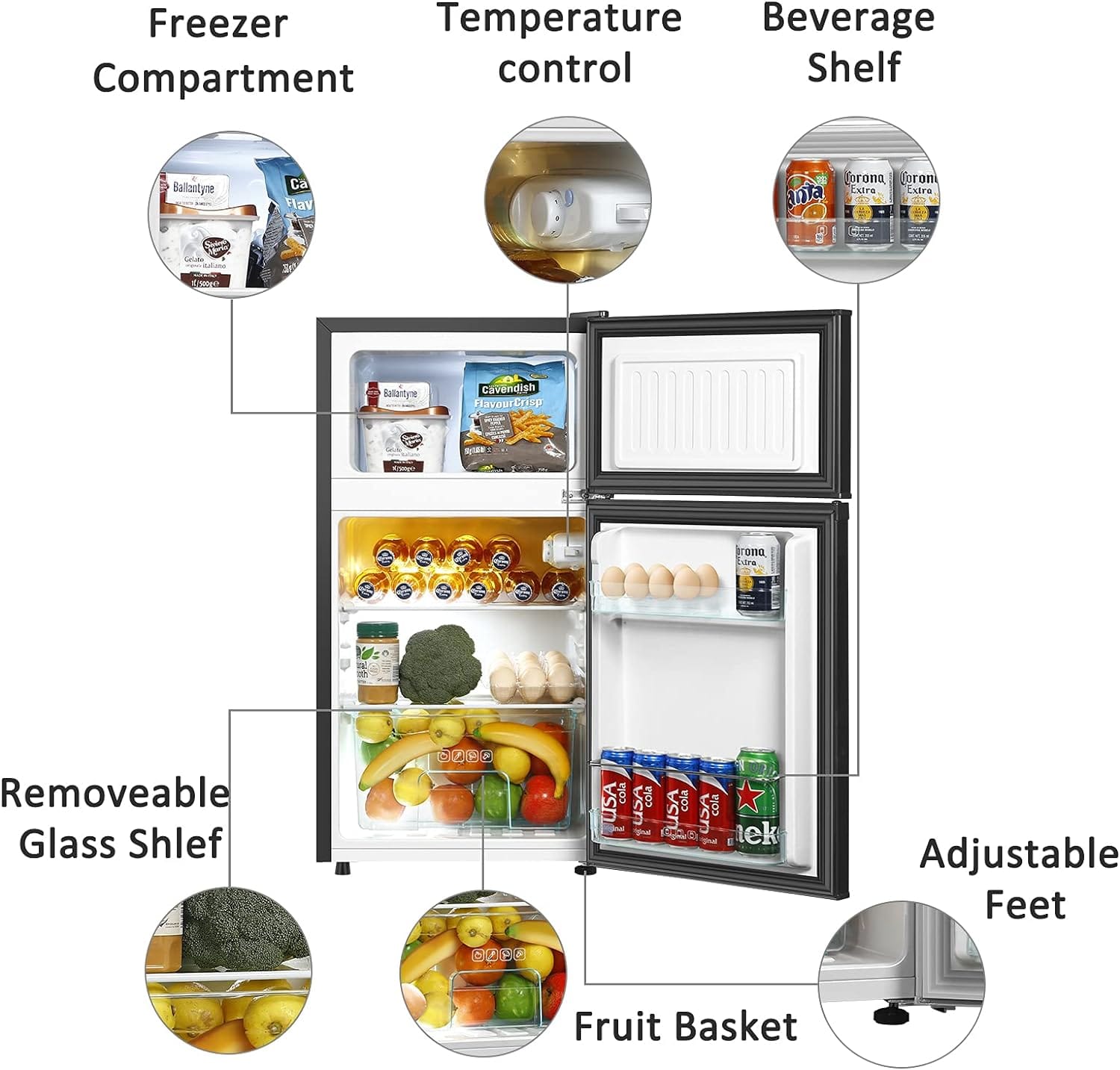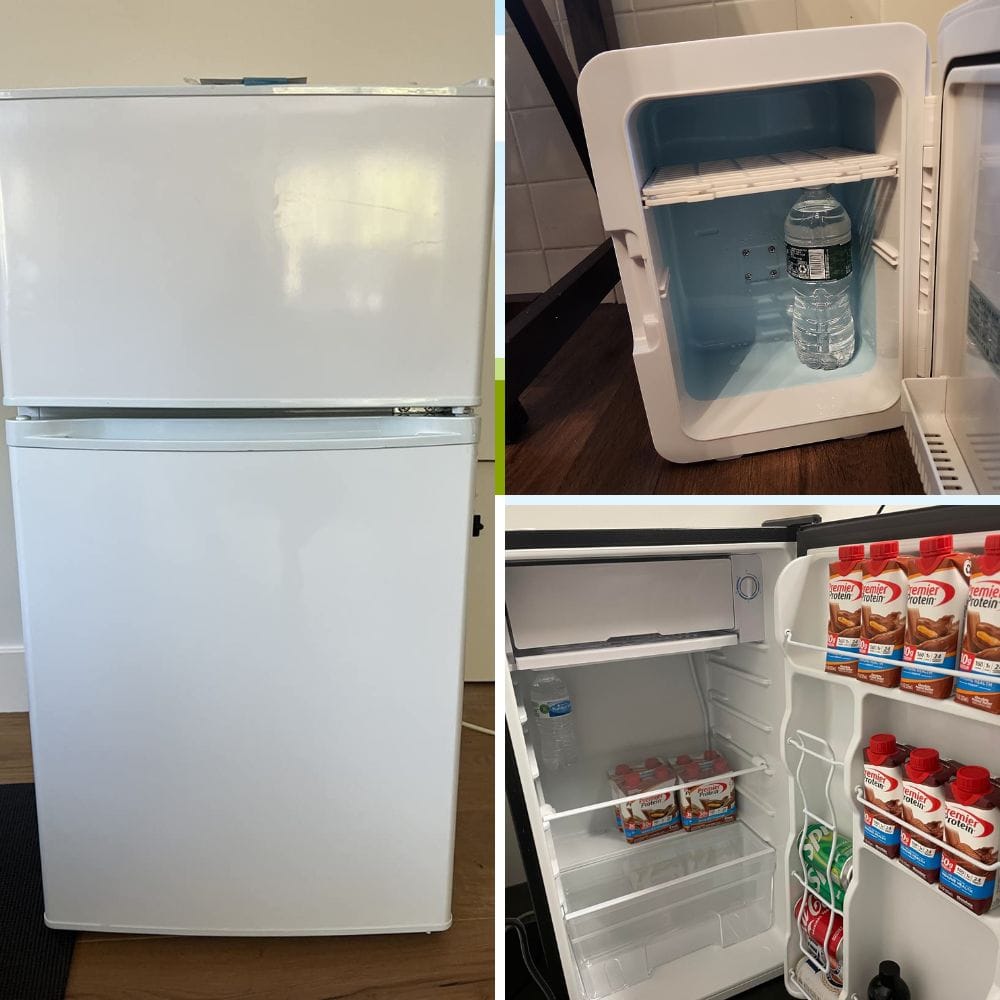Key Takeaways:
- Understanding the Impact: Learn about the potential effects of sleeping next to a mini fridge on your health and well-being.
- Safety Measures: Discover practical tips to ensure a safe sleeping environment when a mini fridge is nearby.
- Enhancing Sleep Quality: Explore strategies to improve sleep quality despite the presence of a mini fridge.
Introduction to Mini Fridges in Bedrooms
Mini fridges have become a staple in many bedrooms, especially in dorms and small apartments. Their convenience is undeniable, offering easy access to snacks and drinks without the need to trek to the kitchen. However, the question arises: is it safe to sleep next to one? Understanding the potential implications of having a mini fridge in your sleeping area is crucial for maintaining both safety and comfort.
The compact size of mini fridges makes them an attractive option for tight spaces. Yet, their presence in a bedroom can introduce concerns about noise, electromagnetic fields, and energy consumption. These factors can influence your sleep quality and overall health. By examining these aspects, you can make informed decisions about whether a mini fridge belongs in your sleeping quarters.
Noise Levels and Sleep Disruption

One of the primary concerns with having a mini fridge in the bedroom is the noise it generates. Mini fridges often produce a low hum or occasional clicking sounds as they cycle on and off. For light sleepers, these noises can be disruptive, leading to fragmented sleep and reduced restfulness. It's essential to consider the noise level of your mini fridge and how it might affect your sleep patterns.
To mitigate noise issues, consider placing the mini fridge on a soft surface or using soundproofing materials to dampen the sound. Additionally, selecting a model known for its quiet operation can make a significant difference. By addressing the noise factor, you can create a more conducive environment for restful sleep.
Electromagnetic Fields and Health Concerns
Another aspect to consider is the electromagnetic fields (EMFs) emitted by mini fridges. While the levels are generally low, prolonged exposure to EMFs has raised health concerns for some individuals. It's important to understand the potential risks and take steps to minimize exposure, especially if the fridge is placed close to your bed.
To reduce EMF exposure, maintain a safe distance between your sleeping area and the mini fridge. Ideally, position the fridge at least a few feet away from where you rest. Additionally, unplugging the fridge when not in use can further decrease EMF exposure, contributing to a healthier sleeping environment.
Energy Consumption and Environmental Impact

Mini fridges, while convenient, can also contribute to increased energy consumption. This not only impacts your electricity bill but also has environmental implications. Understanding the energy usage of your mini fridge can help you make more sustainable choices and reduce your carbon footprint.
Opt for energy-efficient models that are designed to consume less power. Look for Energy Star-rated appliances, which are recognized for their efficiency. By choosing a more sustainable option, you can enjoy the convenience of a mini fridge without compromising your commitment to environmental responsibility.
Temperature Regulation and Food Safety
Maintaining the right temperature in your mini fridge is crucial for food safety. Improper temperature settings can lead to spoilage and potential health risks. It's important to regularly check and adjust the temperature to ensure your food and beverages are stored safely.
Keep a thermometer inside the fridge to monitor the temperature. The ideal range for a mini fridge is between 37°F and 40°F (3°C to 4°C). Regularly cleaning and defrosting the fridge can also help maintain optimal performance and prevent the buildup of ice, which can affect temperature regulation.
Space Optimization and Room Layout

Incorporating a mini fridge into your bedroom requires thoughtful space planning. Ensuring that the fridge fits seamlessly into your room layout can prevent clutter and maintain a harmonious environment. Consider the placement of the fridge in relation to other furniture and ensure it doesn't obstruct pathways or create a cramped atmosphere.
Utilize vertical space by placing the fridge on a sturdy shelf or stand. This not only saves floor space but also keeps the fridge at a convenient height for access. By optimizing your room layout, you can enjoy the benefits of a mini fridge without sacrificing comfort or aesthetics.
Healthier Alternatives to Bedroom Mini Fridges
For those concerned about the potential drawbacks of having a mini fridge in the bedroom, exploring alternative solutions can be beneficial. Consider using a cooler or insulated bag for short-term storage of snacks and drinks. These options can provide similar convenience without the noise and energy consumption associated with a mini fridge.
Additionally, investing in a small, energy-efficient fridge for the kitchen can serve as a central storage solution for perishables. This approach not only reduces the need for a bedroom fridge but also encourages healthier eating habits by keeping food in a designated area.
Tips for a Peaceful Sleep Environment

Creating a peaceful sleep environment is essential for quality rest. Beyond addressing the presence of a mini fridge, consider other factors that contribute to a restful atmosphere. This includes controlling light exposure, maintaining a comfortable room temperature, and minimizing distractions.
Use blackout curtains to block external light and consider a white noise machine to mask disruptive sounds. Establishing a bedtime routine that promotes relaxation can also enhance sleep quality. By focusing on these elements, you can achieve a tranquil sleeping environment that supports restorative sleep.
The Role of Routine in Sleep Quality
Establishing a consistent sleep routine can significantly impact your sleep quality. Going to bed and waking up at the same time each day helps regulate your body's internal clock, making it easier to fall asleep and wake up naturally. This routine can be particularly beneficial if you're dealing with the disturbances caused by a mini fridge.
Incorporate calming activities into your pre-sleep routine, such as reading or meditating. Avoid screens and stimulating activities before bed, as they can interfere with your ability to wind down. By prioritizing a regular sleep schedule, you can improve your overall sleep quality and resilience to potential disruptions.


Can the noise from a mini fridge affect my sleep?
Yes, the noise from a mini fridge can disrupt sleep, especially for light sleepers. Consider using soundproofing materials or selecting a quieter model to minimize disturbances.
Are there health risks associated with EMF exposure from mini fridges?
While EMF levels from mini fridges are generally low, prolonged exposure may raise concerns for some individuals. Maintaining a safe distance and unplugging the fridge when not in use can reduce exposure.
How can I make my mini fridge more energy-efficient?
Opt for Energy Star-rated models and regularly maintain your fridge by cleaning and defrosting it. These steps can help reduce energy consumption and environmental impact.

Sleeping next to a mini fridge presents both conveniences and challenges. By understanding the potential impacts on noise, EMF exposure, and energy consumption, you can make informed decisions about its placement in your bedroom. Implementing strategies to mitigate these factors, such as optimizing room layout and establishing a consistent sleep routine, can enhance your sleep quality and overall well-being.











